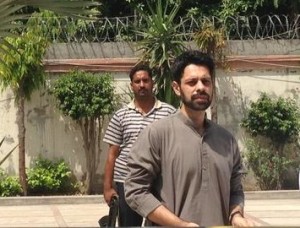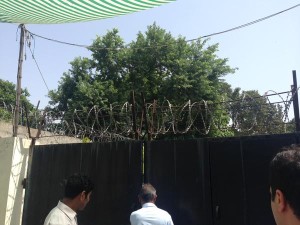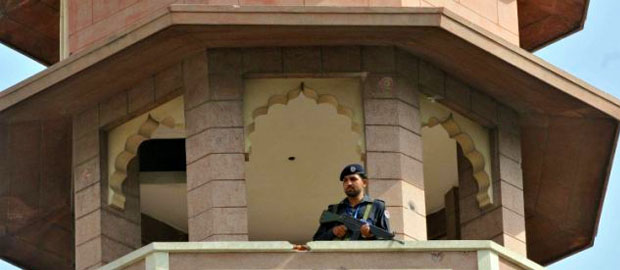When you visit a mosque, you don’t really expect to go through a fence topped with barbed wire and be greeted with men carrying rifles.
But when it’s a mosque where dozens of worshipers were gunned down and killed five years ago, it’s become necessary.
There are an estimated two millions Ahmadis in Pakistan. They see themselves as Muslims and consider their founder, Mirza Ghulam Ahmed, a kind of prophet — problematic for most mainstream Muslims, who believe there are no prophets after Prophet Mohamed (PBUH). A 2011 PEW study says only 7% of Pakistanis believe Ahmadis are Muslim. 66% said they weren’t and 26% refused to answer or didn’t know.
In 1984, the then-president made it a punishable offense for Ahmadis to “practice, propagate or even proclaim” their faith. Hate propaganda is widespread against them today, hundreds of them have been killed, and even their graveyard has been vandalized.
We sat with three members of the Ahmadi community in what they are not allowed to call a mosque. For their safety, they asked I not publish any photos of the space.
“Being a Muslim in Pakistan doesn’t mean you believe in God and Mohammed as his messenger. It means you don’t believe in the founder of the Ahmadiyya community.” — Usman Ahmed.
(Which is ironic to think about — your identity as Muslim means you have to believe in the Ahmadi founder so you can deny his prophethood).
“Incitement to murder is is openly done in Pakistan and the state does nothing about it. Pamphlets tell people to kill Ahmadiyyas is an act of worship. The government prevents us from voting. We can’t call our mosque a mosque, only a place of worship. Our publications are constantly banned. Our children in schools are bullied. Propaganda says the first sign of love of prophet is hate of Ahmadis — he never even heard of us!” — Shameen Ahmad Khalid
The pamphlets are anecdotal evidence and of course can’t represent all Pakistanis.
“I think it used to be that people believed we were Muslim but now I think it has seeped into most people’s consciousness that we aren’t. The question has moved from ‘are they Muslim’ to ‘should they live in Pakistan’ and now to ‘should they live?’” — Usman Ahmed.

Usman came to Pakistan 11 years ago from the UK. And was quick to point out that persecution of Ahmadis isn’t limited to Pakistan:
“It’s world-wide. When I was in London and my college found out there was a ‘heretic’ on campus they were offended by my existence and put up a sign saying ‘no infidels allowed.’”
The Ahmadi persecution raises an interesting question: Is it just limited to them? What about other minorities? What about Shi’a, who some Muslims also consider to be non-Muslims? (Incidentally, many Shi’a don’t accept Ahmadis as Muslims) Or Sufis?
“Pakistan isn’t a heaven for Muslims anymore, let alone minorities. […] How can you open the door to legislate someone’s belief and not believe it will pass to other groups? […] Persecution is same with every minority, Ahmadi persecution is just historically older. It’s easier for Christians to accept their minority status because they are a different religion, but we say we are Muslims, so it’s part of our identity that is being denied.” — Usman Ahmed.
Another PEW study says 47% of Pakistans don’t consider Shi’a Muslim. 15% don’t consider Sufis Muslim either. So although I agree Ahmadis have it bad in Pakistan, I would say they’re not the only ones. When asked why they think Ahmadis might be persecuted more, one of the speakers mentioned the historical underpinnings, but another put it down to jealousy.
“The first Nobel prize won in Pakistan was by an Ahmaidi. We are very educated, we are registered as blood donors and we work for the betterment of our society everywhere we go. […] They sit in their mosques and preach hate against us.” — Syed Qamar Suleman.
I couldn’t help but feel though, that the very ‘us vs. them’ paradigm that mainstream Muslims were accused of doing, was the same one being unconsciously affirmed. In a later visit to an Islamic school, we were told that:
 “For Ahmadis we have a different attitude of behavior than Christians— because they call themselves the true Muslims and don’t call us Muslims because we believe Mohammad was the final prophet.”
“For Ahmadis we have a different attitude of behavior than Christians— because they call themselves the true Muslims and don’t call us Muslims because we believe Mohammad was the final prophet.”
It’s always horrible to be persecuted for your faith, and I agree that:
“I should be able to be a Christian-Buddha-worshiping-Sikh if I want to be. Even if you consider Ahmadis to believe there is a new prophet, that shouldn’t limit my Pakistani identity in any way.” — Usman Ahmed
But I do believe just as Ahmadis are pushing for their freedom to call themselves Muslims, Muslims have the right to not recognize them as Muslims. I can be against your oppression and not believe you’re a Muslim.

